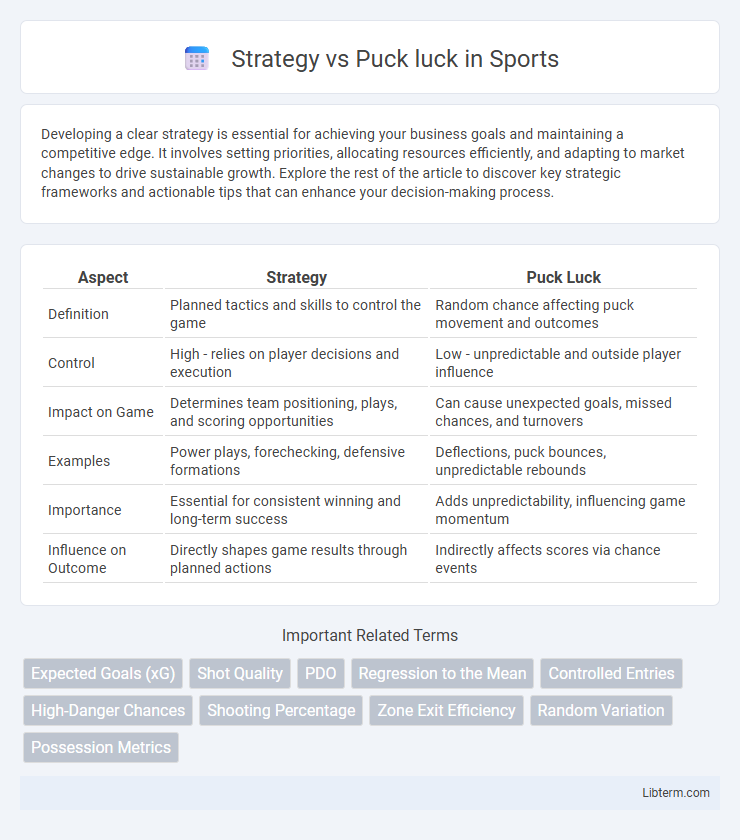Developing a clear strategy is essential for achieving your business goals and maintaining a competitive edge. It involves setting priorities, allocating resources efficiently, and adapting to market changes to drive sustainable growth. Explore the rest of the article to discover key strategic frameworks and actionable tips that can enhance your decision-making process.
Table of Comparison
| Aspect | Strategy | Puck Luck |
|---|---|---|
| Definition | Planned tactics and skills to control the game | Random chance affecting puck movement and outcomes |
| Control | High - relies on player decisions and execution | Low - unpredictable and outside player influence |
| Impact on Game | Determines team positioning, plays, and scoring opportunities | Can cause unexpected goals, missed chances, and turnovers |
| Examples | Power plays, forechecking, defensive formations | Deflections, puck bounces, unpredictable rebounds |
| Importance | Essential for consistent winning and long-term success | Adds unpredictability, influencing game momentum |
| Influence on Outcome | Directly shapes game results through planned actions | Indirectly affects scores via chance events |
Defining Strategy and Puck Luck in Hockey
Strategy in hockey involves planned tactics and coordinated team efforts designed to control the game, optimize player positioning, and capitalize on scoring opportunities. Puck luck refers to unpredictable events where the puck bounces favorably or defies expected outcomes, often resulting in unexpected goals or defensive breaks. While strategy relies on skill, preparation, and analysis, puck luck is inherently random and can significantly influence the momentum and final score despite careful planning.
The Impact of Strategy on Game Outcomes
Strategy significantly affects game outcomes by guiding decision-making processes and optimizing resource allocation, which increases the likelihood of success in puck luck scenarios. Players leveraging well-developed strategies can anticipate opponents' moves, control game tempo, and capitalize on scoring opportunities more effectively. Empirical analyses reveal that teams with superior strategic planning consistently outperform those relying primarily on chance in competitive puck-based games.
Understanding Puck Luck: Randomness in Hockey
Puck luck refers to the unpredictable nature of puck bounces and deflections in hockey, significantly impacting game outcomes beyond player skill and strategy. Understanding randomness in puck movement emphasizes the influence of chance events, such as unexpected rebounds or fortunate puck trajectories, which can alter scoring opportunities and momentum. Analyzing puck luck helps teams develop more resilient strategies by accounting for variability in game situations and performance metrics.
Statistical Analysis: Separating Skill from Chance
Statistical analysis in hockey differentiates strategy from puck luck by examining metrics like shot quality, expected goals (xG), and shot location to evaluate player and team performance beyond mere outcomes. Advanced analytics isolate skill-driven contributions by assessing consistent patterns over time, filtering out random variance caused by puck luck or unpredictable bounces. This approach enables coaches and analysts to make data-driven decisions, emphasizing strategic plays and minimizing reliance on chance factors.
Real-World Examples: When Strategy Trumps Luck
In the 2004 NBA Finals, the Detroit Pistons' disciplined defensive strategy overcame the star power of the heavily favored Los Angeles Lakers, demonstrating strategy's power over luck. In chess, Garry Kasparov's calculated opening moves consistently outmaneuver opponents despite occasional lucky moves. Corporate case studies like Apple's strategic product innovation highlight how strategic planning builds long-term success beyond random market fluctuations.
Iconic Moments Decided by Puck Luck
Iconic moments in hockey often hinge on puck luck, where an unexpected deflection or unpredictable bounce determines the game's outcome. Legendary playoff goals like Bobby Orr's 1970 Stanley Cup-winning shot or Mario Lemieux's improbable deke highlight how chance puck movements can alter hockey history. These instances reveal how luck with the puck can override even the most calculated strategies, underscoring the sport's thrilling unpredictability.
Coaching Perspectives: Balancing Preparation and Unpredictability
Coaches emphasize the importance of strategic preparation in hockey, focusing on analyzing opponents' tendencies, optimizing player lineups, and developing targeted game plans to enhance team performance. However, they also recognize the role of puck luck--random, unpredictable events such as deflections, bounces, and referee decisions--that can significantly impact game outcomes despite meticulous preparation. Effective coaching balances rigorous strategy implementation with adaptability, fostering mental resilience and quick decision-making to navigate the inherent uncertainties of the sport.
Advanced Stats: Predicting Luck vs. Strategy
Advanced stats in hockey like Corsi and Expected Goals (xG) differentiate between skill-driven strategy and random puck luck by analyzing shot quality and possession metrics over large sample sizes. Predictive models use these advanced statistics to isolate consistent player and team performance from variance caused by puck bounces, providing a clearer measure of true skill. Over time, teams with high xG and positive possession differentials tend to outperform those relying on favorable luck, underscoring the value of strategy-based metrics in forecasting outcomes.
Fan Perception: Narratives of Luck and Mastery
Fans often perceive hockey outcomes through a dual narrative of strategy and puck luck, where skillful plays are occasionally overshadowed by unpredictable bounces. The debate emphasizes how successes are attributed either to a team's mastery in tactics or to fortuitous events beyond control. This tension shapes fan engagement, as narratives of luck introduce excitement while respect for strategy reinforces appreciation for the sport's complexity.
Building a Winning Team: Prioritizing Strategy Over Luck
Building a winning team demands a focus on well-crafted strategy rather than relying on puck luck or chance events. Analytical approaches, consistent training, and data-driven decision-making substantially increase the likelihood of competitive success. Prioritizing strategic planning over randomness ensures sustained performance and long-term growth in team outcomes.
Strategy Infographic

 libterm.com
libterm.com